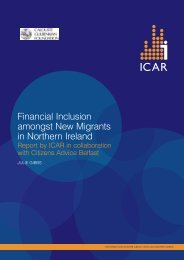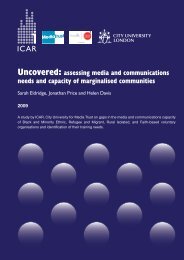Navigation guide Refugee populations in the UK: Algerians - ICAR
Navigation guide Refugee populations in the UK: Algerians - ICAR
Navigation guide Refugee populations in the UK: Algerians - ICAR
Create successful ePaper yourself
Turn your PDF publications into a flip-book with our unique Google optimized e-Paper software.
ut had not been prepared to follow some of <strong>the</strong> orders he received and had to leave <strong>the</strong> country.<br />
In England, he found that he had little chance of work<strong>in</strong>g as a doctor:<br />
‘Every day on <strong>the</strong> television I see “shortage of doctors, shortage of doctors” and I want to work, but <strong>the</strong>y<br />
won’t have me, I can’t work <strong>in</strong> this country. [….] I’m not go<strong>in</strong>g to sweep or stack shelves.’ 95<br />
• The World University Service and <strong>the</strong> British Medical Association are address<strong>in</strong>g <strong>the</strong> concerns<br />
around <strong>the</strong> qualifications of doctors but <strong>the</strong>se are obviously issues that need much wider<br />
consideration if <strong>the</strong> skills of refugee <strong>populations</strong>, such as <strong>Algerians</strong>, are not to be wasted.<br />
• The issue of employment for undocumented migrants or those whose asylum claim has been<br />
rejected is l<strong>in</strong>ked to a much larger set of issues that are beyond <strong>the</strong> scope of this <strong>guide</strong>.<br />
Isolation<br />
• The uncerta<strong>in</strong>ty of <strong>the</strong> conflict has underm<strong>in</strong>ed <strong>Algerians</strong>’ trust <strong>in</strong> each o<strong>the</strong>r and left many feel<strong>in</strong>g<br />
extremely isolated. 96<br />
• Few of <strong>the</strong>m have established <strong>the</strong> solidarity networks that exist with<strong>in</strong> more established refugee<br />
<strong>populations</strong>.<br />
• The fact that such a large proportion of <strong>the</strong> Algerian population <strong>in</strong> <strong>the</strong> <strong>UK</strong> have arrived so recently<br />
also leads to a widespread unfamiliarity with <strong>the</strong> dom<strong>in</strong>ant culture.<br />
• In terms of religious observance, most <strong>Algerians</strong> questioned as part of <strong>the</strong> author’s research were<br />
able to visit local mosques if <strong>the</strong>y wished and, though <strong>the</strong>re is certa<strong>in</strong>ly no mosque particularly<br />
l<strong>in</strong>ked to <strong>the</strong> Algerian community, <strong>the</strong>y felt very welcome worshipp<strong>in</strong>g with <strong>the</strong> dom<strong>in</strong>ant South<br />
Asian Muslim group. One man who had been dispersed under <strong>the</strong> government scheme to<br />
Bournemouth was delighted at <strong>the</strong> diversity he found:<br />
‘We have a small mosque with about 200 people who attend regularly, from everywhere; <strong>Algerians</strong>, yes,<br />
but <strong>the</strong>re are also Iraqis, Indonesians, Congolese, Tunisians, Moroccans, it is very diverse!” 97<br />
• <strong>Algerians</strong> who have been <strong>in</strong> <strong>the</strong> <strong>UK</strong> a significant amount of time speak English well or fluently, but it<br />
is still more common for those arriv<strong>in</strong>g to speak French better than English. This reduces <strong>the</strong><br />
opportunities for contact with those who do not speak French or Arabic/Tamaziyt.<br />
• <strong>Algerians</strong> are very highly represented among <strong>the</strong> client group of several refugee mental health<br />
services <strong>in</strong> London. It is possible that <strong>the</strong>re is less of a stigma attached to mental health issues for<br />
95 Collyer, M. (2002) ‘Expla<strong>in</strong><strong>in</strong>g change <strong>in</strong> established migration systems: <strong>the</strong> movement of <strong>Algerians</strong> to France and<br />
<strong>the</strong> <strong>UK</strong>’ University of Sussex, DPhil <strong>the</strong>sis, bound and recorded at <strong>the</strong> British Library.<br />
96 All data <strong>in</strong> this section refer to <strong>the</strong> author’s <strong>the</strong>sis unless o<strong>the</strong>rwise stated: Collyer, M. (2002) ‘Expla<strong>in</strong><strong>in</strong>g change <strong>in</strong><br />
established migration systems: <strong>the</strong> movement of <strong>Algerians</strong> to France and <strong>the</strong> <strong>UK</strong>’ University of Sussex, DPhil <strong>the</strong>sis,<br />
bound and recorded at <strong>the</strong> British Library.<br />
97 Collyer, M. (2002) ‘Expla<strong>in</strong><strong>in</strong>g change <strong>in</strong> established migration systems: <strong>the</strong> movement of <strong>Algerians</strong> to France and<br />
<strong>the</strong> <strong>UK</strong>’ University of Sussex, DPhil <strong>the</strong>sis, bound and recorded at <strong>the</strong> British Library.<br />
<strong>Navigation</strong> <strong>guide</strong> to refugee <strong>populations</strong>: <strong>Algerians</strong><br />
©<strong>ICAR</strong> 2004, moral rights Michael Collyer<br />
42

















